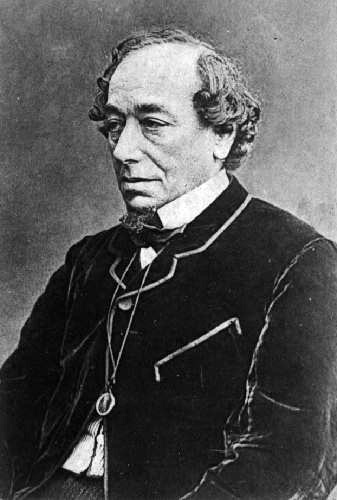Benjamin Disraeli słynne cytaty
„Człowiek nie jest tworem okoliczności, to okoliczności są tworem człowieka.”
Źródło: M. Podzielska, Nauczyciel-lider. Jak budować autorytet?, WSiP, 2009, s. 38.
Benjamin Disraeli cytaty
Źródło: Horacy Safrin, Przy szabasowych świecach. Wieczór drugi, Wydawnictwo Łódzkie, Łódź 1981, s. 173
Źródło: Geoffrey Wigoder, Słownik biograficzny Żydów, Wydawnictwo Da Capo, 1998, s. 5 (motto).
„Są trzy rodzaje kłamstw: kłamstwa, okropne kłamstwa i statystyki.”
There are three kinds of lies: Lies, Damn Lies, and Statistics. (ang.)
przypisane Disraeliemu przez Marka Twaina.
Źródło: Przykazania etyki prawniczej. Księga myśli, norm i rycin, wyb. Roman Tokarczyk, wyd. Wolters Kluwer Polska, s. 121.
Next to knowing when to seize an opportunity, the most important thing in life is to know when to forgo an advantage. (ang.)
Źródło: „Przekrój”, Wydania 14–26, Krakowskie Wydawnictwo Prasowe, 1999, s. 121.
„Rasowy mężczyzna jest drapieżnikiem, który ściga tylko wielką zwierzynę, władzę lub kobietę.”
Źródło: Małgorzata Subotić, Wino, kobiety i bilard, Presspublica, 1997, s. 269.
Benjamin Disraeli: Cytaty po angielsku
“You know who critics are?— the men who have failed in literature and art.”
Źródło: Books, Coningsby (1844), Lothair (1870), Ch. 35. Compare: "Reviewers are usually people who would have been poets, historians, biographers, if they could; they have tried their talents at one or the other, and have failed; therefore they turn critics", Samuel Taylor Coleridge, Lectures on Shakespeare and Milton, p. 36. Delivered 1811–1812; "Reviewers, with some rare exceptions, are a most stupid and malignant race. As a bankrupt thief turns thief-taker in despair, so an unsuccessful author turns critic", Percy Bysshe Shelley, Fragments of Adonais.
“The world is a wheel, and it will all come round right.”
Źródło: Books, Coningsby (1844), Endymion (1880), Ch. 70.
Lord George Bentinck: A Political Biography (1852), p. 496.
1850s
In response to a man who asked Disraeli "What is the difference between a misfortune and a calamity?" cited in Wilfrid Meynell, Benjamin Disraeli: An Unconventional Biography (1903), p. 146.
Sourced but undated
Źródło: Speech https://api.parliament.uk/historic-hansard/lords/1881/mar/04/candahar-resolution in the House of Lords (4 March 1881).
“The more you are talked about the less powerful you are.”
Źródło: Books, Coningsby (1844), Endymion (1880), Ch. 36.
“There is no index of character so sure as the voice.”
Bk. II, Ch. 1.
Books, Coningsby (1844), Tancred (1847)
“Nobody is forgotten, when it is convenient to remember him.”
Źródło: Letter to Lord Stanhope (17 July 1870), cited in William Flavelle Monypenny and George Earle Buckle, The Life of Benjamin Disraeli, Earl of Beaconsfield, Vol. 5 (1920), p. 123-125.
Źródło: Speech at Mansion House (7 August 1867), quoted in William Flavelle Monypenny and George Earle Buckle, The Life of Benjamin Disraeli, Earl of Beaconsfield. Volume II. 1860–1881 (London: John Murray, 1929), p. 287
Źródło: Speech of 9 November 1867.
Źródło: Speech to the Conservatives of Manchester (3 April 1872), quoted in William Flavelle Monypenny and George Earle Buckle, The Life of Benjamin Disraeli, Earl of Beaconsfield. Volume II. 1860–1881 (London: John Murray, 1929), p. 531.
Źródło: Books, Coningsby (1844), Endymion (1880), Ch. 23.
“If you are not very clever, you should be conciliatory.”
Źródło: Books, Coningsby (1844), Endymion (1880), Ch. 85.
Źródło: Books, Coningsby (1844), Lothair (1870), Ch. 29.
Book V, Chapter 6.
Books, Coningsby (1844), The Young Duke (1831)
“Debt is the prolific mother of folly and of crime.”
Book 2, chapter 1.
Books, Coningsby (1844), Henrietta Temple (1837)
Bk. III, Ch. 4.
Books, Coningsby (1844), Tancred (1847)
Speech http://hansard.millbanksystems.com/commons/1849/feb/01/address-in-answer-to-the-speech in the House of Commons (1 February 1849).
1840s
Speech http://hansard.millbanksystems.com/commons/1850/may/14/foreign-corn in the House of Commons (14 May 1850).
1850s
“The world is weary of statesmen whom democracy has degraded into politicians.”
Źródło: Books, Coningsby (1844), Lothair (1870), Ch. 17.
Źródło: Speech in Aylesbury (14 November 1861), quoted in William Flavelle Monypenny and George Earle Buckle, The Life of Benjamin Disraeli, Earl of Beaconsfield. Volume II. 1860–1881 (London: John Murray, 1929), p. 96
“He seems to think that posterity is a pack-horse, always ready to be loaded.”
Speech in the House of Commons (3 June 1862)
1860s
“Every man has a right to be conceited until he is successful.”
The 'Advertisement' to the 1853 edition.
Books, Coningsby (1844), The Young Duke (1831)
“There is moderation even in excess.”
Book VI, Chapter 1.
Books, Coningsby (1844), Vivian Grey (1826)
“We are indeed a nation of shopkeepers.”
Book I, Chapter 11.
Books, Coningsby (1844), The Young Duke (1831)
Źródło: Speech http://hansard.millbanksystems.com/commons/1873/mar/11/second-reading-adjourned-debate in the House of Commons (11 March 1873).
